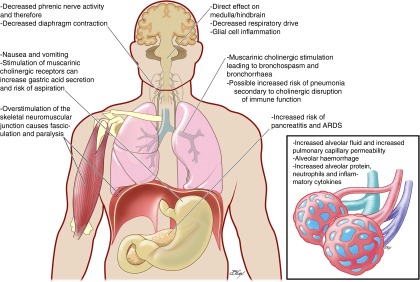Figure 4.

Pulmonary complications of organophosphorus (OP) poisoning. Exposure to OP compounds causes the acute cholinergic syndrome characterized by reduction in central respiratory drive, bronchospasm and hypoxia due to bronchorrhea and alveolar edema, and depolarizing neuromuscular junction (NMJ) block. This may resolve or progress to acute respiratory failure that would be fatal without medical input. Reduced consciousness and loss of airway control in the cholinergic syndrome increases the risk of aspiration, resulting in chemical pneumonitis that will worsen oxygenation and may progress to ARDS. Overstimulation of the NMJ causes chronic peripheral dysfunction that may occur simultaneously with the acute cholinergic syndrome or after it has resolved with normal cerebral function (then termed the “intermediate syndrome”). This NMJ dysfunction often requires days and weeks of mechanical ventilation with associated risk of ventilator-associated pneumonia and barotrauma.
